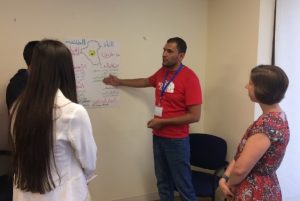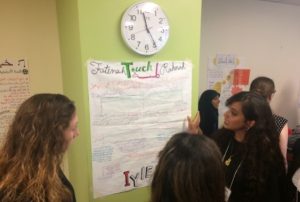-
What We Do
- WHERE WE WORK
-
About Us
 Welcome Message from Carol Jenkins
Welcome Message from Carol JenkinsFor more than 90 years, World Learning has equipped individuals and institutions to address the world’s most pressing problems. We believe that, working together with our partners, we can change this world for the better.
On my travels, I’ve had the opportunity to meet with many of those who have joined us in this mission. In Baghdad, we’ve trained more than 2,300 Iraqi youth who are already giving back at home. In London, our partners in the TAAP Initiative strongly believe that we are all responsible to practice inclusion. And in Vermont, our Experiment in International Living and School for International Training participants prove every day that they have the tools and the determination to change the world.
Please join us in our pursuit of a more peaceful and just world.
- Get Involved
Media Center > Story
Iraqi Students Lead New Efforts to Aid Refugees and Internally Displaced Persons
September 13, 2017
In late July, just weeks after government forces liberated Mosul from ISIS control, a group of Iraqi high school students met with officials from the U.S. State Department, Iraq’s Ministry of the Interior, and various NGOs. They weren’t there to network: The students were presenting comprehensive plans to provide displaced Iraqis access to education, psychosocial support, healthcare, and more.
Ahmad Soofe was one of these young Iraqis. He has seen the refugee crisis firsthand. In June 2014, when he was in the ninth grade, his family was forced from their home in Mosul. Though his father found work and resettled the family in Erbil, Soofe knows he was lucky. He has visited the refugee camps outside of Erbil and witnessed the hardship. “I want to solve it,” Soofe says
Finding innovative solutions to Iraq’s refugee crisis was the focus of this year’s Iraqi Young Leaders Exchange Program (IYLEP), a State Department-funded and World Learning-operated scholarship program. For 10 years, IYLEP has brought Iraqi teenagers to the U.S. for leadership training and cross-cultural exchange through homestays and community service. However, this particular IYLEP group was the first conducted in Arabic to reach those without English language skills.

Throughout the morning, students and their interpreters presented initiatives ranging from providing medical care for displaced people to collecting furniture and other household conveniences for those who are finally able to return to liberated cities like Mosul. Soofe and his student partners outlined an Education, Training, and Online project (ETO) to teach internally displaced children how to read and write, as well as provide job and life skills training to young adults, particularly women.
Soofe’s team had conceived of the project earlier in the IYLEP program. Before arriving in D.C., the group spent a couple of weeks in San Diego where they stayed with families and visited nonprofits to learn about community service. One of those nonprofits offered to give Soofe’s group computers for trainings via Skype, while another agreed to conduct those trainings.
Altogether, IYLEP was an important experience for Soofe. “It’s the best chance in the world to improve your abilities,” he says. “To be a leader. To serve your community.”
Not all projects are likely to be successful. Some may struggle to find funding or the volunteer support. But at least one student group is already well on its way to realizing its vision.

Hamsa Ahmed and Ghuroob Alsheikh Gumar presented a detailed plan to host an arts festival in Baghdad to help internally displaced children heal the psychological wounds of war. The festival would offer workshops teaching basic drawing skills and handicrafts, as well as a bevy of entertainment and snacks, all run by volunteers. “This is their moment,” Ahmed says. “Forget about the past.” Gumar agrees. “Wherever there is art, there is peace,” she says. After the one-day festival, the young women plan to give children drawing pads to practice and teach others how to use art as therapy.
Their plan impressed one official from Iraq’s Ministry of the Interior. Fadhil Salih, director of contract verification in the Office of the Inspector General, decided that the project was so well-organized — and realistic — that he immediately offered the two young women a traditional Iraq tent in which to host the festival. He also volunteered his own children to work at the event. “I saw powerful students having goals to help displaced students,” Salih says.
Salih — who was visiting World Learning’s offices in Washington, DC as part of the International Visitor Leadership Program — touted the importance of the IYLEP program in fostering civic engagement among Iraqi youth. “We as leaders in the Ministry of Interior will do our best to help the students we have seen,” he adds.
Ahmed is encouraged by the support from a member of the Iraqi government and is determined to return to Iraq and exercise her new leadership skills for the good of her community. “Every human has a goal, but sometimes we just need a chance to show our abilities,” she explains. “Now I’m a leader. Now I’m a strong female. I can face everything in the world.”





